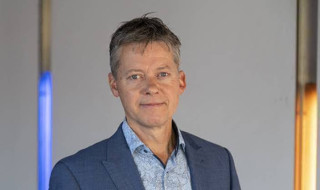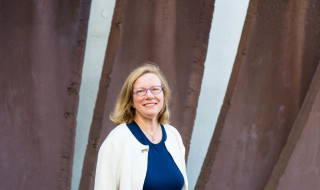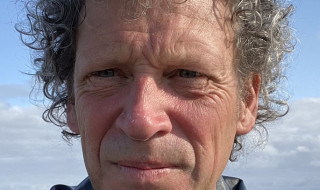Collaborating on Regie op data
What should we do with the data produced within the institutions? Numerous possibilities come within reach, for better research and education. But are we on the right track? How do we gain direction over our data (further Regie op data)?
It's a bit like the frog in a pan, with water being slowly brought to boil. At first it begins to experience pleasant warmth. But gradually the indefinable feeling creeps up that something might go wrong.
Such a feeling also prevails around the data that is produced in the world of research and education. They come in all kinds: from research data to algorithms and from study data to metadata.

Ruben Kok, director Dutch Techcentre for Life Sciences (DTL) and board member Health-RI
What they have in common is that we are steadily collecting more and more data and at the same time, more and more powerful resources are becoming available to derive new insights from that data. This entails great promises of better research and better education. Meanwhile, it also brings new challenges, around data and data sovereignty.
Agreements
Those promises are only fulfilled if you can share data, says Ruben Kok, director of the Dutch Techcentre for Life Sciences (DTL) and board member of Health-RI: “Research is often multidisciplinary. So, you have to make agreements about how you give each other access to your data, and under what conditions others can use it. This gives you real control over your data.”
According to Kok, the conditions for this management can be summarized in the FAIR principles: data must be Findable, Accessible, Interoperable and Reusable. This brings us to the ideal of Open Science, where the entire scientific community can make optimal use of all collected data. Kok currently leads the FAIR program line of the National Open Science Programme.
"This is an excellent time for institutions to make agreements with each other about the content of data stewardship."
Invent the wheel
The ideal of Open Science is increasingly shared. But that's also where the problems start. There are many initiatives in the Netherlands alone that aim to bring Open Science closer, according to an inventory by SURF (see frame text). Often in their own way, and without coordinating with each other.

Sarah Coombs, advisor Research Support bij Saxion
That is not very useful when you strive for interchangeability and accessibility, says Sarah Coombs, Research Support advisor at Saxion. “You have to prevent everyone from inventing the wheel themselves.”
Kok also thinks that this is not imaginary: “The risk is that everyone will set their own standards and set up their own internal systems. Based on the idea that your own solutions will be quickly adopted by others.”
“We must therefore prevent that,” continues Kok. “At the same time, we must ensure that everyone has enough options to manage access to their own data, for example. That requires agreements on standards.”
Lost direction
What happens if there is no coordination? A few years ago, the rectores magnifici warned in an open letter that Dutch higher education was in danger of losing control of its data to foreign tech giants.
Coombs: “If we don't make agreements ourselves, someone else will do it for us. And impose their rules on us. Can we then do what we want with the data we have? For example, share data?”
“If we don't make agreements ourselves, someone else will do it for us. And impose their rules on us."
Study data
No wonder there are so many initiatives, the issue is enormously complex. Take study data, for example. JaapJan Vroom, senior advisor educational innovation at Deltion College, a ROC in Zwolle, is leading a project to realize 'data-supporting education' within the institution. Vroom emphasizes that this involves more than just technical choices. “The starting point should be that students are in control of their own data.”
For him, this is not only a matter of GDPR obligations, but also of public values such as autonomy, and of citizenship. “Students must learn to ask themselves what happens to their data and make conscious choices about it.”

JaapJan Vroom, senior advisor educational innovation at Deltion College
Then comes the question of how the students can make those choices known to others. In mbo, generic courses on for instance the Dutch language are dominated by large publishers. These publishers have stored the study data in their own learning environments. Fortunately, publishers and representatives from primary and secondary education and mbo (including the MBO Council) make agreements together that should contribute to a responsible exchange of information for education.
"Students having control over their own study data however does go a step further. As an institution, you cannot achieve this on your own. You must organize it together, because students will soon be extending their education across several institutions. And mbo, hbo and wo are increasingly intertwining, which means you have to take into account existing agreements and frameworks."
Digitalisation impulse
The example of the study data shows how everything is related to each other: educational content, legislation, market parties, technology, learning pathways across several institutions. The SURF Regie op data investigation therefore speaks of a 'holistic' challenge. All aspects of Regie op data influence each other. How on earth can we tie all those threads together?
Students having control over their own study data however does go a step further. As an institution, you cannot achieve this on your own.
People are crucial, says Ruben Kok. “We need to build a broad professional community of data stewards at the institutions. And these experts should preferably all have had similar training. Only then can we harmonize the data approach in research and educational institutions.”
“So, we first have to establish those standards in consultation,” Coombs adds. “The time for this is ripe, now that the Digitalisation Impulse is bringing the entire educational field together.”
Kok wholeheartedly agrees: “This is an excellent time for institutions to make agreements with each other – and also with all kinds of institutes which hold public data – about the content of data stewardship. Because with that, we also create a research ecosystem in which we can really practice better science.”
No island
But fragmentation is also a problem here, warns Sarah Coombs: “In the Netherlands, more than in other countries, we are already entering into discussions about Regie op data. But the Netherlands is not an island.”
That is why, in particular, the research communities should be encouraged to make agreements about standards with international colleagues. Kok: “If a European Open Science Cloud is set up, we will have to fully participate in it, to make optimal use of it and to bring our own good ideas to the table. We cannot discover afterwards that wrong agreements have been made and things have been implemented which are of no use to us.”
Text: Aad van de Wijngaart
Regie op Data: What is it? Where are we now? And how to get it… (especially if you think you lost it)
As part of its 2021-2022 strategy, SURF collected insights on Regie op data from members of the SURF cooperative. These insights on Regie op data will be represented both within the SURF Services and within the envisaged Innovation Zones and therefore form an important input for how the ambitions defined in the 2022-2027 SURF Strategy will be taken up.
A team led by quartermaster Thomas van Himbergen interviewed seventeen stakeholders. Including directors, data officers and policymakers from universities, universities of applied sciences, MBO, UMCs, UKB and National Platform Open Science. The three people featured in this article also belong to this group.
What were their wishes? Where did they see bottlenecks and dilemmas? What trends did they observe and what did they understand by 'Regie op data' at all?
From the answers, the researchers distilled seven wishes and six bottlenecks. Their main conclusion is that we are dealing with a 'holistic' challenge. Everything is connected to everything else: issues of infrastructure, sovereignty, collaboration, culture, market players and more. So Regie op data requires all these aspects to be taken into account.
SURF Community Regie op data
During SURF's Regie op data initiative, it also became clear that many data-focused initiatives already exist or are being planned in the Netherlands. The need for more collaboration and agreements does not only play out within institutions, but rather across the entire field.
In order to allow better cooperation on a national level, the researchers suggest mapping the field of data-related initiatives in research and education, which hopefully also leads to more Regie op data. For this purpose, a SURF Community has been set up.
Regie op data, however, does not offer direct solutions, but it does confirm the need to act together in safeguarding public values, as recent articles in the media (e.g., about data storage in American clouds) also underline. What is paramount in this phase, is making data-related issues transparent, and bringing people and initiatives together.
Go to SURF Community Regie op data.
'Collaborating on Regie op Data' is an article from SURF Magazine. Monthly the newest articles in your inbox? Then subscribe to the SURF Magazine newsletter (in Dutch).
Back to SURF Magazine
Questions about this article? Mail to magazine@surf.nl.
